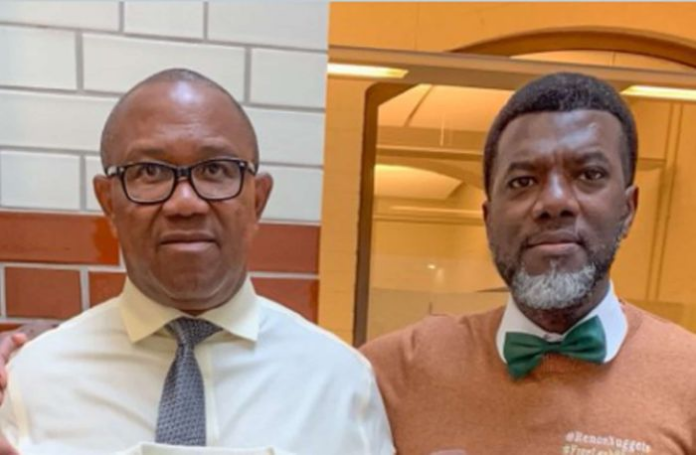Social commentator and former presidential aide, Reno Omokri, has accused Peter Obi, the Labour Party’s (LP) former presidential candidate, of hypocrisy and selective outrage over the rising incidents of kidnapping for ransom in Nigeria. According to Omokri, Obi has been quick to condemn kidnapping and abductions in northern and southwestern Nigeria, but has largely remained silent on the severe kidnapping crisis in the Southeast, his home region.
Omokri’s accusation comes on the back of disturbing new data highlighting the alarming rate of kidnappings for ransom in the Southeast. In a post shared on his official social media handle on January 11, Omokri pointed out the disparity between Obi’s public stance on the issue and the reality on the ground.
“The Southeast had the highest incidents of kidnapping for ransom in Nigeria in 2024,” Omokri said, citing data compiled by SMB Morgen, a reputable analytical firm. “Anambra has emerged as the epicenter of these kidnappings, followed closely by Imo, Abia, Enugu, and Ebonyi states. Yet, Peter Obi’s public remarks on the crisis have largely omitted this region.”
In stark contrast, Omokri pointed out that Obi’s social media posts often focus on the kidnapping crises affecting other parts of the country. “If a kidnapping incident occurs in the North, Southwest, or South-South, Peter Obi will be quick to speak out, sometimes in fiery and accusatory terms,” Omokri remarked. “But when similar crimes happen in Igboland, his response is either delayed or lukewarm. It raises a valid question – why this double standard?”
According to the data from SMB Morgen, Southeast Nigeria has seen a sharp rise in abductions for ransom in the past year, with Anambra State alone accounting for a significant portion of the incidents. Despite this, Peter Obi’s statements on the subject have been rare, and when he has spoken on it, they have lacked the intensity seen in his remarks about other regions.
Omokri expressed his disbelief at Obi’s silence, given the gravity of the situation in his home state of Anambra, a place he has often called his “political and emotional heartland.” “Peter Obi has been remarkably silent on the abduction of his fellow Igbos,” he said. “It’s almost as if the kidnappers are not a threat to his own people. Why does he reserve the strongest words for the North and Southwest, but chooses to tread lightly when the victims are Igbos?”
In his critique, Omokri referred to Obi’s past reactions to kidnapping cases outside the Southeast. He recalled how Obi had been vociferous in condemning the recent kidnappings in the North, even drawing comparisons to the insecurity in the country’s northeast. “When kidnappings occur in the North, Obi is often at the forefront, condemning them in the strongest terms. He has used vivid, almost theatrical language to describe the threat that these criminals pose. But when similar crimes occur in his own backyard, there’s a noticeable difference in tone,” Omokri observed.
The social commentator further questioned Obi’s ability to govern Nigeria equitably, given his selective responses to national crises. “Can someone who ignores or downplays the suffering of his own people really be trusted to govern a nation as diverse as Nigeria?” Omokri asked. “A leader must speak out against injustice, no matter where it occurs or who the victims are. This kind of selective outrage is concerning.”
Obi’s silence on the issue of kidnapping in the Southeast has raised eyebrows, particularly among his supporters, who have been calling for more vocal leadership on security issues. Some have suggested that Obi’s reluctance to speak out may be a political move, fearing backlash from certain powerful groups in his region. However, these speculations have yet to be confirmed by the former governor of Anambra State.
In the past, Obi has been an outspoken critic of Nigeria’s security situation, particularly the challenges posed by Boko Haram and other criminal groups in the northern states. He has also raised concerns about the increasing frequency of kidnappings in the Southwest and the South-South regions. However, these regions have not seen the same level of kidnappings as the Southeast, which has experienced an unprecedented wave of abductions in recent months.
Some security experts have warned that the Southeast is becoming a major hotspot for kidnapping gangs, with an increasing number of criminal groups targeting wealthy individuals, politicians, and business owners. The practice has become so rampant that local law enforcement agencies are struggling to cope with the scale of the problem.
“The situation in the Southeast is dire. We are witnessing a significant rise in abductions for ransom,” said Dr. Ifeanyi Okafor, a security analyst based in Enugu. “Anambra is the worst-hit state, but the problem is spreading to other parts of the region as well. The government needs to act fast to curb this menace.”
While the Nigerian government has pledged to tackle the issue of kidnapping across the country, the problem persists, especially in regions where local authorities are overwhelmed by the scale of the criminal activities. In the Southeast, many residents have expressed frustration over the lack of political will to address the growing insecurity.
Omokri’s comments have sparked a debate on social media, with some Nigerians accusing Peter Obi of playing politics with a national security issue. Others have defended him, arguing that he may have been cautious about making inflammatory remarks that could exacerbate ethnic tensions.
Nevertheless, the controversy surrounding Obi’s stance on Southeast kidnappings raises important questions about the responsibility of leaders to address security concerns in their home regions. As the situation continues to deteriorate in the Southeast, many Nigerians are calling on Obi to put his words into action and address the security challenges facing his people.

